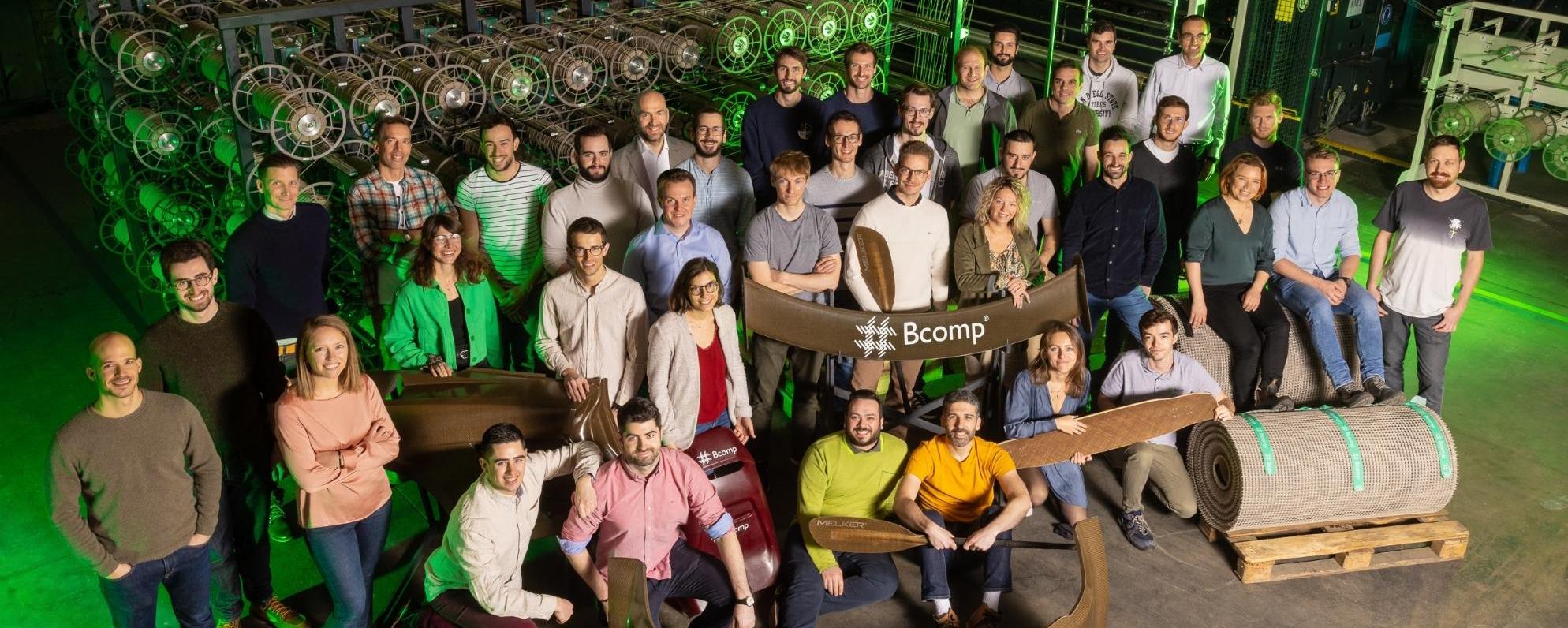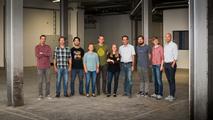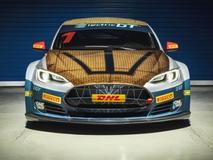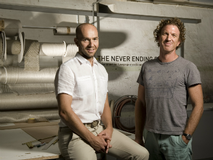“The Bcomp story started out of a garage. We are a cheesy garage startup,” explained Christian Fischer in our interview about the company that he and Julien Rion founded in 2011 to create lightweight yet high-performance skis. Garages are still a theme, but the Fribourg-based cleantech-company plays in a different league: Bcomp now transforms the high-performance automotive industry with sustainable lightweighting with natural fiber composites, and Bcomp’s solutions can be found in the cars of Porsche, McLaren, and DTM (Deutsche Tourenwagen Masters). We talked to Christian Fischer about Bcomp’s journey toward the pole position, the role of wool socks in building a sustainable business, and his experience as a “Venturelab baby.”
 Christian, Bcomp started out with skis, and now you collaborate with some of the heavyweights of the automotive industry, such as McLaren, Porsche, and DTM (Deutsche Tourenwagen Masters) to develop lightweight car body parts. How did Bcomp move from skis to professional race cars?
Christian, Bcomp started out with skis, and now you collaborate with some of the heavyweights of the automotive industry, such as McLaren, Porsche, and DTM (Deutsche Tourenwagen Masters) to develop lightweight car body parts. How did Bcomp move from skis to professional race cars?We are not a proper spin-off, even though both Julien and I are EPFL alumni. We started out of a passion for being outdoors and making lightweight skis. And it was pretty clear from the beginning that we could eventually use the ski and sports industry as an initial market to build Bcomp. The core of what we do has always been light-weighting—replacing standard engineering materials and making things lighter—so mobility was our focus. Ever since the first business plan, we have said that we would use sports and leisure to acquire proof of concept and build credibility. Then, we would adapt the technology platform to whatever we needed to move into mobility markets.
Even though the automotive market is typically a difficult and quite a scary market, we understood that the carmakers are using motorsports as an innovation and marketing platform, so it was quite a natural entry door for us. We targeted motorsports 3.5 years ago, acquired the first customers 2.5 years ago, with Porsche Motorsports, and that is how we were able to expand into that platform very quickly. There is really that logic of building credibility and using synergies from what we did before and then feeding those into the next strategic market.
Was the automotive industry welcoming, or were there a lot of obstacles?
If you had asked me four or five years ago, I would have told you that the entry barriers are tremendously high, as is the reluctance to change. Nobody was waiting for a company like Bcomp to bring sustainable natural fiber technologies to the automotive industry. To enter such a business, the performance benefit must be significant: We can now reduce weight by up to 50% and drastically cut the amount of plastic used.
The recent strong focus on ESG topics [Environmental, Social, and Corporate Governance] in society acts as an additional, important driver. Our solutions enable OEMs [Original Equipment Manufacturers] to reduce the environmental footprint of their products. At the same time, for a “green” solution, you really need to have your data in place—nobody can afford a “greenwashing” story today. But even if you get the right people to listen and you have your foot in the door—regardless of having the best product—you will have no impact unless you can scale and deliver. That is our obsession right now: Scaling our automotive impact.

ampliTex fabric (left), ampliTex and powerRibs (middle), ampliTex and powerRibs carshell (right)
The automotive industry and the sports industry are all about performance. Bcomp brings in a sustainability aspect. How do innovation, performance, and sustainability interact?
This is a very central question. It is unthinkable for us to be in the substitution business and create innovations that have a heavier footprint than whatever we replace. For many years, we’ve almost only focused on the engineering performance of our products, almost hiding the environmental credentials in the background. Sustainability is very important to us as a company, but we would not communicate too much about it. And now, with the trends we touched upon before, it is clearly something that we are putting more in the forefront. Before we could link our solutions to brands like Polestar, Porsche, or McLaren, we had this image of “wool socks and Birkenstock sandals.” We fought hard to get rid of that. We often refer to Bcomp as being on the edge between natural products and high-tech. The fact that we connected our product to high-performance image brands and the shift in people’s minds really play in our favor. We are almost at the level now where we are saying that being sustainable needs to be part of your specs; it becomes part of the performance, but it is still not an easy connection. For us, it is unthinkable that the innovation does not contain the sustainability aspect. There is a direct correlation there.
Your product is used in sports, automotive industry, construction, satellites, and even musical instruments. After land, water, and space, what else do you want to conquer?
I like the term “to conquer.” In terms of the range of applications, we cover a lot, and I think we cover enough. For me now, it is really about the scaling. We have done all of these beautiful projects, which display the full potential of our technology and product. But the next step we need to conquer is actually larger markets. It is about industrializing what we are doing. We have revenue, and we could be happy with just having a lifestyle business that is feeding between five to 10 people, but now we are a team of 30 because we see the potential to grow much bigger. So if you ask me what we want to conquer, it is really large-scale markets, where we will have an impact.
I can imagine that having high-performance cars in your portfolio opens doors. Now people have to take you seriously in those large-scale markets, don’t they?
It is a very strong statement. With all due respect to the ski, sports, and leisure industries, the automotive industry or the mobility industry, in general, is another league. When it comes to developing a startup, building your credibility is critical. It starts when you go pitching in the Swiss startup ecosystem: You have your background with one of the Swiss Federal Institutes of Technology; maybe you have a PhD and the first patents. It is all about credibility. And then you go out to the market or to your suppliers, and guess what, it is the same thing again. They need to hear from you and believe that you eventually make money when partnering with you. For me, building credibility is extremely important and maybe something that high-tech startups underestimate at the beginning. B2B marketing, where you tell your story and raise awareness—it is incredibly important. We like to talk a lot about our strategic partnerships because press releases about Porsche and McLaren put us on a different level in people’s minds.

Electric GT racing Tesla (left) and Porsche 718 Cayman GT4 CS MR (right) with Bcomp natural fibre body kits
© Bcomp / 2020 Dr. Ing. h.c. F. Porsche AG respectively
Does this also add pressure?
I do feel that the pressure increases. That is also what I tell the students when I teach and coach: A lot of us entrepreneurs are driven by this motivation of being independent and starting our own thing. Ten years down the road, you understand that you have accumulated stakeholders around you who all have expectations based on the promise and stories that you told them. Guess what? I do not feel that independent anymore. Of course, I am in the driver’s seat and have the luxury of putting together the team of my dreams. Even though we are now getting into a phase where we can distribute the pressure over more shoulders, it is undeniable that you need a solid portion of self-confidence—and not arrogance—to be an entrepreneur. We know that we are at the very beginning of the journey. We have not achieved that much yet. If we want to have an impact, it is now the next 12 to 18 months that will make a difference.
You just mentioned your students: You are a teacher at Innosuisse and at the University of Fribourg. What do you teach entrepreneurs and students?
Even though entrepreneurs and future founders operate in different spaces and face different challenges, they all fight the adversity to change. Humans are, by definition, energy-minimum animals. You ask me to change my health insurance or phone plan? It is a nightmare! So we need to be aware that we have a product or solution that we think is better than what is out there, and we have to face that adversity to change that is common to all of us. So, always make sure you have something that has a great advantage over whatever you are replacing or fighting.
Another lesson has to do with the perception of risk. I ask my students to look at whatever they are scared of and ask themselves—on a risk-scale from 1 to 10—how risky it is what they are going to do. They are highly educated people, coming out of some of the best schools in the world, with an average age of about 25. So, what is going to happen if you take a step outside of the general flow of the job market and career and just give it a try for a year or two? Even in Switzerland, we have reached the mindset now, giving it a try and starting a new company, and failing is okay.
Of course, the students also teach me things: Just seeing that raw startup spirit at the very beginning, where you suddenly discover for yourself that starting a company could be an option for yourself. Where people discover the world with all its complexity but also with all the opportunities. This is a nice reminder of what the essence of entrepreneurship really is.
The TOP 100 Swiss Startup Award, which was founded in the same year as Bcomp, recently celebrated its 10th anniversary. Bcomp was one of the TOP 100 Swiss startups from 2012 to 2016, taking home second price in 2016. When you look at the Swiss startup ecosystem, what has changed in the last ten years?
 I am probably one of the first-generation babies of Venturelab and its ecosystem, and I am a very good example of Venturelab’s work. [Besides being a TOP 100 startup, Bcomp was a Venture Kick winner in 2011 and a Venture Leader in 2012.] I already felt 10 years ago that Venturelab had done a great job in structuring the ecosystem, and there were a lot of tools out there. It has grown much more mature—from an already very mature situation back then. The ecosystem has just raised its game now: When I look at the young entrepreneurs nowadays, I am not sure if Bcomp would be able to shine as much as it did back then. We were very much bootstrapping for many years, and I think that now startups are much more professional much earlier. In the scale-up phase that we are in now, we reach out beyond the boundaries of Switzerland because the ecosystem is not prepared yet or mature enough yet to handle the scale-ups. I am not sure if it is a criticism or if I would expect it. For me, it is just clear that, for the coming investments, we look beyond the boundaries of Switzerland to expand and find smart money.
I am probably one of the first-generation babies of Venturelab and its ecosystem, and I am a very good example of Venturelab’s work. [Besides being a TOP 100 startup, Bcomp was a Venture Kick winner in 2011 and a Venture Leader in 2012.] I already felt 10 years ago that Venturelab had done a great job in structuring the ecosystem, and there were a lot of tools out there. It has grown much more mature—from an already very mature situation back then. The ecosystem has just raised its game now: When I look at the young entrepreneurs nowadays, I am not sure if Bcomp would be able to shine as much as it did back then. We were very much bootstrapping for many years, and I think that now startups are much more professional much earlier. In the scale-up phase that we are in now, we reach out beyond the boundaries of Switzerland because the ecosystem is not prepared yet or mature enough yet to handle the scale-ups. I am not sure if it is a criticism or if I would expect it. For me, it is just clear that, for the coming investments, we look beyond the boundaries of Switzerland to expand and find smart money. Last but not least: How will the TOP 100 startups shape the next decade?
I may be a bit idealistic, but change will have to happen more radically in the next 10 to 15 years than it has happened in the last 50 years. Society as a whole has to make a big step and a paradigm shift. We need to dare to make the jump from the two-percent-growth hamster-wheel and figure out how we measure the success of a company so that we do not jeopardize the future.
The importance of the startup ecosystem will increase. I would say that the TOP 100 has raised a lot of awareness, but it still belongs to the startup ecosystem, and I believe it will start to attract awareness with people outside of the network. Last but not least, there is a whole generation that is joining the workforce, and they want to engage in startups and purpose-driven companies. This will radically increase the focus and spotlight on the TOP 100 companies.
Bcomp AG: Superior products from natural fibers
Bcomp™ is a Swiss cleantech company and ESG-enabler that develops and sells sustainable lightweighting solutions. Its proprietary natural fibre-based reinforcement technologies ampliTex™ and powerRibs... Read more







